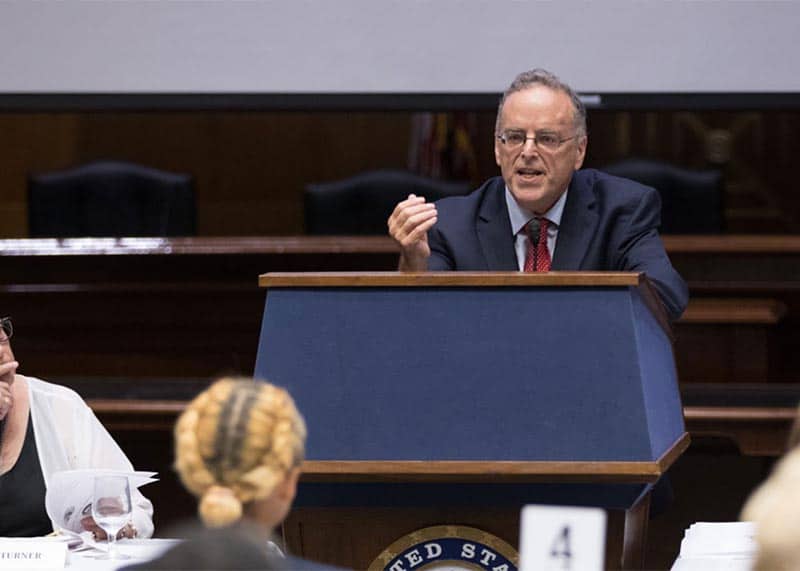In honor of National Whistleblower Day, Kohn, Kohn & Colapinto, LLP will host a panel on developments in international whistleblower law, and the existing mechanisms through which international whistleblowers can report wrongdoing.
Featuring Mark Worth, investigative journalist, public interest activist, author, and one of the world’s foremost experts on whistleblower policy, and Kelsey Condon, attorney for Danske Bank Whistleblower Howard Wilkinson (who blew the whistle on the largest international money laundering case in world history). This conversation will center around the new EU whistleblowing directive and its harmonization with existing whistleblower laws such as the Foreign Corrupt Practices Act. Below is an overview of these topics.
Click here to register for the free events, including this panel, commemorating National Whistleblower Day.
The New EU Directive
The “EU Whistleblower Directive” initially agreed upon by the European Parliament in April was formally approved by European Union ministers on October 7, 2019. Pursuant to this Directive, EU member countries are required to enact conforming national legislation on whistleblowers by 2021. The Directive is effectively the broad framework of minimum requirements for a national whistleblower law. Therefore, EU members now have the unique opportunity to create more robust whistleblower programs that will help protect whistleblowers and serve each country’s national interests.
Kohn, Kohn & Colapinto, LLP and the National Whistleblower Center were highly engaged in drafting the Directive and will continue to offer assistance to EU nations to create effective whistleblower programs. Stephen Kohn, a KKC partner, provided the European Commission on the then proposed EU Whistleblower Directive guidance to ensure that whistleblowers could report externally to appropriate law enforcement, as well as internally to compliance programs. Mr. Kohn represents Howard Wilkinson, the Denmark-based Danske Bank whistleblower whose allegations implicated Danske Bank in a €200 billion Russian money laundering scandal. The bank is being criminally investigated in the UK, US, France, and Estonia. Wilkinson also provided testimony to the European Parliament’s Special Committee On Financial Crimes, Tax Evasion and Tax Avoidance (TAX3) on November 21, 2018. This testimony was influential in both the motivation for the Directive and the structuring of its provisions. In his testimony, Mr. Wilkinson highlighted the need to have statutory exceptions to Non-Disclosure Agreements and sufficient whistleblower protection programs in Europe.
The Foreign Corrupt Practices Act
In the U.S., the Foreign Corrupt Practice Act (“FCPA”), is one of the strongest if not the strongest internal whistleblower laws in the world. Although a few other countries have whistleblower laws, none are as comprehensive as the FCPA. This law also grants international jurisdiction, allowing the U.S. government to sanction certain companies and individuals even if they are not U.S.-based.
The FCPA prohibits the payment of bribes to foreign government officials in order to obtain or retain a business advantage, such as winning a government contract or avoiding taxes. Bribes include the payment of or offer to pay “anything of value.” These payments include cash bribes to officials, which may be disguised as “commissions” or “consulting fees,” as well as paying for expensive gifts such as sports cars or even paying for that official’s entertainment or travel expenses. For example, Novartis was recently sanctioned for improperly inducing state physicians to write prescriptions for Novartis drugs by offering to pay for the physicians to attend international conferences.
In general, the FCPA applies to companies that trade on the U.S. or international stock exchanges, as well as companies that trade “American Depository Receipts” on a U.S. exchange, and subsidiaries of publicly traded companies even if that subsidiary is not publicly traded. Further, any U.S. citizen or resident, and any private U.S. company with its primary place of business in the U.S. may be prosecuted under the FCPA.
Moreover, the FCPA allows whistleblowers to remain confidential and anonymous while helping to stop international corruption, and are protected by strong anti-retaliation provisions. The SEC is required to protect the identity of whistleblowers who report through the SEC’s whistleblower program. If a whistleblower submits information through their attorney, their filing will be anonymous, even to the SEC. Whistleblowers must be awarded between 10 and 30 percent of any sanction obtained by the SEC based on the whistleblower’s information. They may also be eligible for an award from sanctions of other government agencies, such as the DOJ.
It does not matter where a whistleblower is from in making an FCPA report. The FCPA provides protections and awards for whistleblowers regardless of U.S. citizenship or country of residence. Many of the whistleblowers our firm represents – for example, in the Novartis case or the Danske case – are not U.S. citizens and do not live in the U.S. In fact, non-U.S. nationals have received millions of dollars in rewards for reporting under U.S. anti-corruption laws.
There are additional mechanisms whistleblowers can use to report international corruption that may not constitute a “bribe,” including anti-money laundering and tax fraud regulations. The IRS (which also has a strong whistleblower program), SEC, and DOJ all investigate money laundering, which is often used to conceal the proceeds of bribery and corruption. Relatedly, the False Claims Act penalizes, among other things, individuals and organizations that commit U.S. customs fraud. This type of fraud can include incorrectly labeled imports, such as endangered plants or animals, in an attempt to circumvent laws both in the U.S. and internationally.
Click here to register for the free events, including this panel, commemorating National Whistleblower Day.
